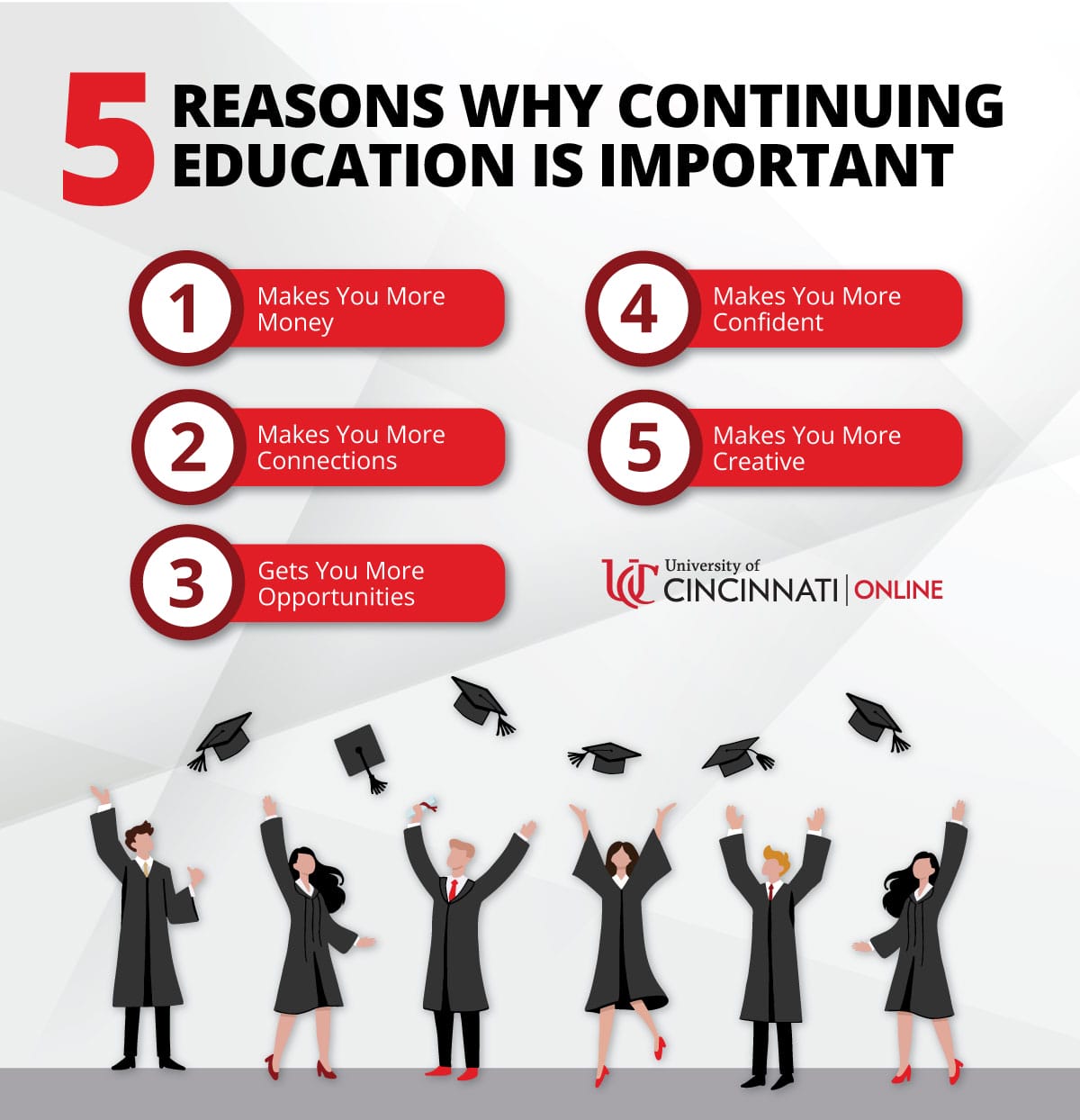5 Benefits of Continuing Education for Career Advancement

More Education. More Opportunities.
Advancing your career in the workplace sounds like a simple enough concept: work hard, stay loyal, and the job will come to you. But while your employer may personally know your willingness and work ethic, the promotion they’re offering needs a candidate who not only excels at their duties but is appropriately skilled and can take on multiple projects at once. What’s more, these opportunities only come up on occasion, and competition among equally qualified coworkers is fierce — which means you need a surefire way to stand out from the pack. Enter: continuing education. A win-win for both employees and employers, continuing your education will upgrade your skills and knowledge, helping you remain competitive in your organization while simultaneously helping your company achieve long-term viability. Better yet, businesses that recognize this benefit often partner with online universities to offer tuition assistance programs for their employees, and yours may be one of them. Because whether you’re looking to advance in your current position or competing for a promotion, employers influenced by your professional development know continuing education has the benefits to help get you more — today and tomorrow.
Key Takeaways
- Boosts Career Potential: Continuing education increases earning potential, provides access to new job opportunities, and helps you stand out in competitive workplaces.
- Expands Professional Network: Advanced courses connect you with professionals from diverse backgrounds, fostering valuable insights and career growth.
- Enhances Skills and Creativity: Lifelong learning builds confidence, sharpens decision-making abilities, and nurtures creativity to tackle workplace challenges effectively.
1. Continuing Your Education Will Make You More Money
As the U.S. labor market continues to recover from the effects of the COVID-19 pandemic, one constant remains: education boosts earnings and reduces unemployment. According to the U.S. Bureau of Labor Statistics, the current median weekly earnings for workers who hold bachelor’s degrees ($1,493), master’s degrees ($1,737), and professional degrees ($2,206) are significantly higher than those who only hold associate degrees ($1,058) and high school diplomas ($899).
2. Continuing Your Education Will Make You More Connections
Partaking in advanced courses can help widen your social and professional networks by compelling you to interact with your peers — many of whom come from various professional backgrounds. This network will be a wealth of insight as you advance in your career, providing opportunities for you to gain information about your industry, hear tips and advice, and learn important news and upcoming changes in your field.
3. Continuing Your Education Will Get You More Opportunities
Rather than remaining stagnant in learning — which can stymie opportunities for promotions — lifelong learning shows your employer that you have the willingness to grow and develop. By adding new skills and abilities to your resume, you’ll be prepared to meet any required qualifications when facing a career transition, which can be the difference in landing new opportunities as they become available — especially when competing with your peers.
4. Continuing Your Education Will Make You More Confident
The best decisions are backed by knowledge and data, and when you have a thorough understanding of your business or subject area —as a result of education — you’re in the best position for confident decision-making. Knowing you’ve acquired the necessary skills to advance in your field, you’ll feel more prepared to take on new tasks and opportunities and utilize your transferable study skills such as organization, time-keeping, and problem-solving to manage them successfully. What’s more, by continually receiving advice and support in the classroom, you’ll learn to react positively to constructive criticism in the workplace which will build trust between you and your supervisor.
5. Continuing Your Education Will Make You More Creative
As humans, we learn to be creative by experimenting, exploring, questioning assumptions, using our imagination, and synthesizing information. By learning about subjects outside of your normal discipline, you’ll encounter new concepts that can help you brainstorm innovative ways to handle related tasks and challenges — an important trait when you’re looking to advance in your career. Plus, studying as a full-time employee will allow you to immediately apply your creative learning to the workplace, adding to your organization’s competitiveness and profitability.

What Can the University of Cincinnati Online Offer You?
As the #1 Best Online College (study.com), we know first-hand that more education equals more opportunities — which is why we created the UC Online Business Partnership Program. Designed to provide full-time employees and their dependents with tuition scholarships, this partnership offers over 100 fully online programs and flexible scheduling for students to balance personal and professional responsibilities. Not sure if your employer is a UC Online Partner? Speak with your supervisor to find out. Ready to learn more? Explore our Business Partnership Program or take the first step in advancing your future by beginning your application today.
Frequently Asked Questions (FAQs)
What are the benefits of continuing education?
While continuing your education offers a lot of benefits, the most notable benefits include increased salary, a broader network, more job opportunities, elevated professional confidence, and improved creativity.
What is the main purpose of continuing education?
Although it will vary on an individual-by-individual basis, the main purpose of continuing education for most folks is likely increased earning potential, professional advancement, and a wider range of employment opportunities.